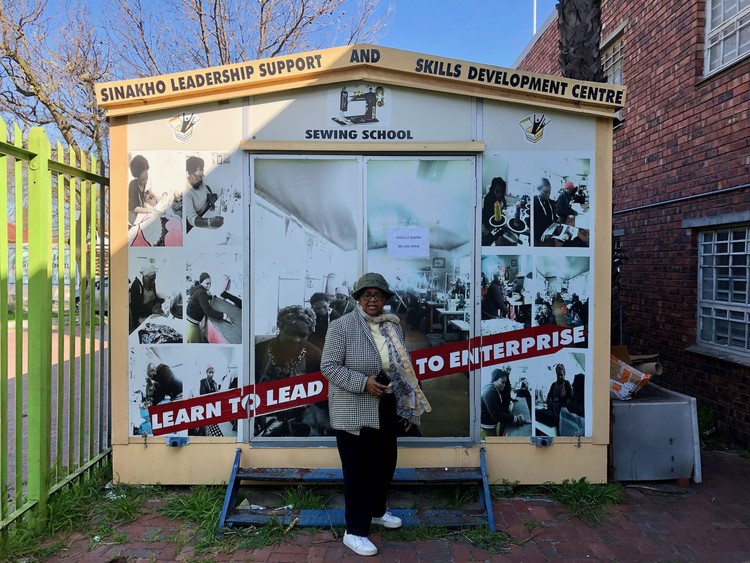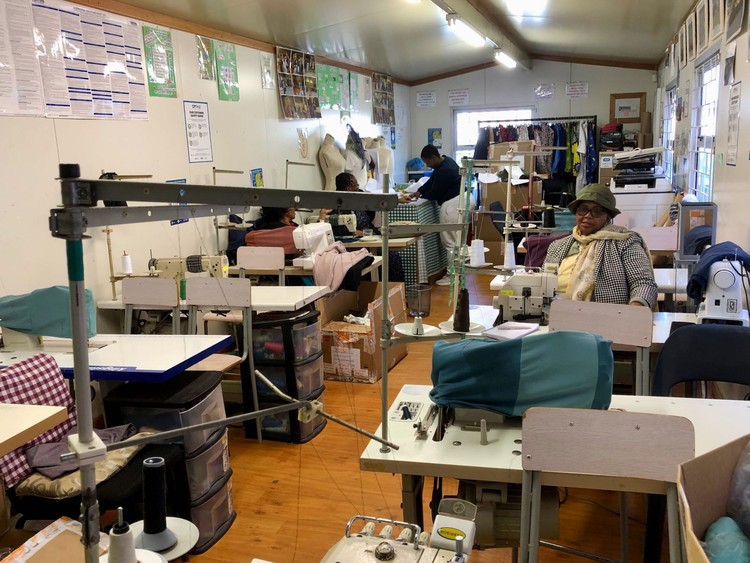Langa’s cramped sewing school needs more space
The Sinakho Skills Development Centre and Entrepreneurship Training Academy
The Sinakho Skills Development Centre and Entrepreneurship Training Academy’s sewing school and garment-making workshop is in Langa at the Guga’Sthebe Arts and Cultural Centre. Photos: Mary-Anne Gontsana
- Operating since 2011, the Sinakho sewing school is part of the Sinakho Skills Development Centre and Entrepreneurship Training Academy in Langa.
- People learn to make garments and when they graduate, they get their own sewing machine.
- The academy is seeking to expand and add more skills programmes to equip more people to create their own employment.
On entering a cramped prefab building tucked away next to Guga S’thebe Arts and Cultural Centre in Langa, we find Lindani Mndende gently tapping his right foot under a desk to keep a sewing machine running. While meticulously stitching, Mndende tells us he started a sewing course in June, here at the Sinakho sewing school.
He says he loves sewing and his dream is to open his own clothing store selling garments he has made.
“I want to sell formal clothes like suits,” says Mndende.
He had a vintage sewing machine at home, which was much slower, and he is delighted by the newer machine at the school.
“Our classes run Monday to Friday from 9am to 3pm. We have three classes a day and take seven students at a time,” says Nolonwabo Base, school administrator and former student, with large fabric scissors in her hand.
Anyone interested in joining the course may apply regardless of their age, she says.
“It is a six-month course and at the end of a course students graduate, receive a Skills Education Training Authority accredited certificate, and their own sewing machine.”
The most difficult garment for students to master is a shirt, because it has many components, and the easiest is a waistcoat, she says.
Founder and programme manager, Nontuthuzelo Phahlana, says, “We get a lot of young people joining the course and at first it becomes a bit shaky because they get bored, but once they start the real work of sewing it becomes fun. And once they can actually make and finish a garment, you see the pride in their eyes when they are looking at their end product.”
Phahlana says her passion for sewing comes from her family. Her grandmother and mother were seamstresses.
“It doesn’t even feel like a job,” she says.
They also run Saturday sewing classes for retired people.
Sewing courses are R7,000 per student.
Sinakho employs two teachers and has about ten sewing machines, two of which are overlockers for specialised stitches and patterns.
During graduation, which is always held in Langa, students showcase the garments they have made.
The school started operating in 2011. Funding is the biggest challenge. Most donations are not monetary.
Besides sewing, the Sinakho Skills Development Centre and Entrepreneurship Training Academy also runs programmes for confectionary and leather products, and teaches manufacturing, entrepreneurship and business management.
“We want to add more programmes, like woodwork. We want programmes that will make starting a business easy. We want to bridge the gap in terms of unemployment because it is high. So basically, we want to expand and that means we need a bigger space.”

Nontuthuzelo Phahlana outside the prefab sewing school
Next: Kwaito star Arthur Mafokate and the dodgy Lottery grant
Previous: Learners launch storytelling project to “recapture the beauty” of Masiphumelele
© 2023 GroundUp. This article is licensed under a Creative Commons Attribution-NoDerivatives 4.0 International License.
You may republish this article, so long as you credit the authors and GroundUp, and do not change the text. Please include a link back to the original article.
We put an invisible pixel in the article so that we can count traffic to republishers. All analytics tools are solely on our servers. We do not give our logs to any third party. Logs are deleted after two weeks. We do not use any IP address identifying information except to count regional traffic. We are solely interested in counting hits, not tracking users. If you republish, please do not delete the invisible pixel.



